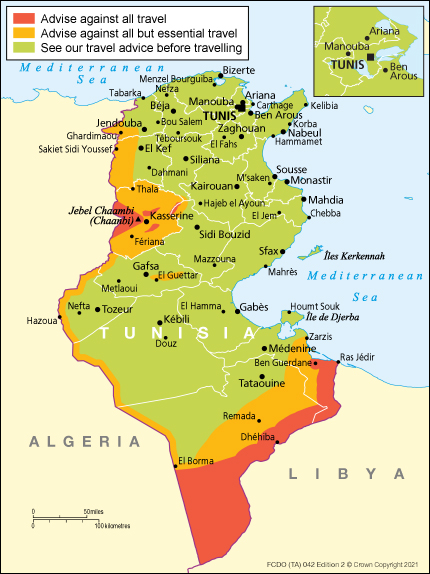Tunisia
Summary

The Foreign, Commonwealth & Development Office (FCDO) advises against all travel to:
- the Chaambi Mountains National Park and the designated military operations zones of Mount Salloum, Mount Sammamma and Mount Mghila
- the militarised zone south of the towns of El Borma and Dhehiba
- within 20km of the rest of the Libya border area north of Dhehiba
- the town of Ben Guerdane and immediate surrounding area
In addition and for security reasons, the FCDO advises against all but essential travel to:
- within 75km of the Libyan border, including Remada, El Borma and the town of Zarzis
- the governorate of Kasserine, including the town of Sbeitla
- within 10km of the border with Algeria south of Kasserine governorate
- within 30km of the border in El Kef and Jendouba governorates south of the town of Jendouba, including the archaeological site of Chemtou
- areas north and west of the town of Ghardimaou in Jendouba governorate, including El Feidja National Park
- within 10km of Mount Mghila
- Mount Orbata
Before you travel, check the ‘Entry requirements’ section for Tunisia’s current entry restrictions and requirements. These may change with little warning. Monitor this advice for the latest updates and stay in contact with your travel provider.
It is more important than ever to get travel insurance and check it provides sufficient cover. See the FCDO’s guidance on foreign travel insurance.
Since 1 July, the city of Sfax has witnessed several days of civil unrest, including reports of injuries, arrests and one death, related to heightened tensions between local residents and migrants from sub-Saharan Africa. Security forces in Sfax and the region are on high alert. Further disturbances could occur with little or no warning and impact other Black people perceived to be of sub-Saharan African origin.
Terrorists are still very likely to try to carry out further attacks in Tunisia, including against UK and Western interests. There have been a number of self-initiated attacks in 2023. On 3 July a National Guard officer was attacked with a knife in the La Goulette area of Tunis.
In June, a police officer was stabbed and killed outside the Brazilian Embassy in Tunis. In May, a fatal shooting took place on the island of Djerba, near to where Tunisian and international visitors were taking part in the annual Jewish pilgrimage at the El Ghriba synagogue. Three security personnel and two civilians were killed, and ten people were injured.
Security forces remain on a high state of alert in Tunis and other places. You should be vigilant at all times, including around religious sites and festivals. Crowded areas, government installations, transportation networks, businesses with Western interests, and areas where foreign nationals and tourists are known to gather may be at higher risk of attack. You should be particularly vigilant in these areas and follow any specific advice of the local security authorities. In more remote areas of the country, including tourist sites in southern Tunisia, security forces’ response times to an incident may vary. Follow the advice of the Tunisian security authorities and your travel company if you have one. See Terrorism
Parliamentary elections took place in December 2022 and January 2023 and the new Parliament opened in March 2023.
Protests occur in Tunisia with little or no warning, and can sometimes become violent. They usually take place in central areas of Tunis and other major cities, and in the vicinity of government buildings, often but not always on weekends or around prominent national anniversary dates. In response to the current situation in Israel and the Occupied Palestinian Territories, peaceful demonstrations have occurred in some Tunisian cities, including outside some Western embassies. Avoid all protests, and move away from gathered crowds. Keep up to date with developments through the media and follow the instructions given by the Tunisian authorities as well as your hotel and tour operator, if you have one. See Political and security situation
You can contact the emergency services by calling:
- 197 (police - when in cities and towns)
- 193 (national guard - when in rural areas or small villages)
- 190 (ambulance)
- 198 (civil protection - for assistance at incidents, such as car accidents, to provide medical assistance and response to fire).
If you’re abroad and you need emergency help from the UK government, contact the nearest British embassy, consulate or high commission. Consular support may be limited in parts of Tunisia.